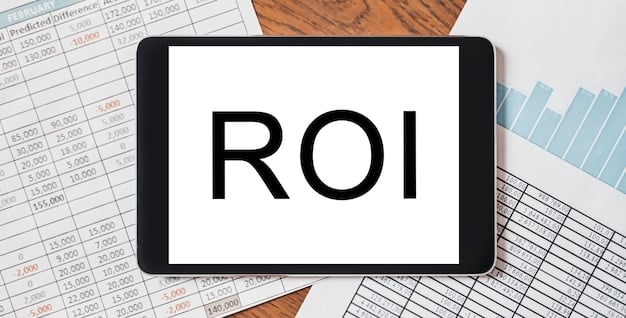Understanding Cryptocurrency Tax Reporting 2025: New IRS Guidelines

Understanding the New IRS Guidelines for Cryptocurrency Tax Reporting in 2025 is crucial for US taxpayers to accurately report digital asset transactions, avoid potential penalties, and potentially maximize deductions by staying informed about evolving regulations and reporting requirements.
Navigating the world of cryptocurrency taxes can be daunting, especially with evolving regulations. Understanding the New IRS Guidelines for Cryptocurrency Tax Reporting in 2025: Avoid Penalties and Maximize Deductions is essential.
What’s New in Cryptocurrency Tax Reporting for 2025
The landscape of cryptocurrency taxation is constantly evolving. For 2025, the IRS is set to implement new guidelines aimed at clarifying and streamlining the reporting process. These changes impact how crypto transactions are reported and what information needs to be provided.
Staying ahead of these changes is key to avoiding penalties and ensuring compliance. Let’s delve into what’s new.

Key Changes in IRS Cryptocurrency Guidelines
Several key changes are expected in the IRS guidelines for the 2025 tax year concerning cryptocurrency reporting. Here are some of the important things you should know:
- Expanded Reporting Requirements: Expect more comprehensive reporting requirements for crypto transactions, potentially including stricter identification of counterparties in transactions.
- Clarification on DeFi and Staking: The IRS is likely to provide further clarification on the tax implications of decentralized finance (DeFi) activities and staking rewards.
- Enhanced Enforcement: Increased scrutiny and enforcement efforts are anticipated, including more audits related to cryptocurrency transactions.
How These Changes Affect You
These changes may affect you in various ways, depending on your involvement with cryptocurrencies:
- Increased Record-Keeping Burden: You may need to maintain more detailed records of your crypto transactions to comply with the new reporting requirements.
- Potential for Higher Tax Liability: Clarifications on DeFi and staking could lead to higher tax liabilities for certain activities.
- Greater Risk of Audits: The increased enforcement efforts mean a higher chance of your crypto transactions being audited.
In summary, the changes in IRS guidelines for 2025 mean taxpayers need to be more vigilant and informed about cryptocurrency tax reporting. This understanding will help in avoiding penalties and accurately reporting digital asset activities.
Understanding Taxable Events for Cryptocurrency
Knowing which cryptocurrency activities are taxable events is fundamental to ensure compliance with IRS regulations. Not all crypto transactions trigger a tax liability, but many do.
Let’s break down the common scenarios that can result in taxes.
Taxable Actions
The following actions are typically considered taxable events:
- Selling cryptocurrency for fiat currency (e.g., USD).
- Trading one cryptocurrency for another.
- Using cryptocurrency to purchase goods or services.
- Receiving cryptocurrency as payment for services rendered.
Non-Taxable Actions
Conversely, the following actions are generally not taxable events:
- Buying cryptocurrency with fiat currency.
- Transferring cryptocurrency between wallets you own.
- Gifting cryptocurrency (although the recipient may have tax implications).
Specific Scenarios
- Staking Rewards: Receiving staking rewards is generally considered taxable income.
- Airdrops: Receiving airdrops may be taxable income, depending on the circumstances.
- Mining: Cryptocurrency mining is also a taxable activity, with the fair market value of the mined coins being considered income.
In essence, understanding which crypto activities constitute taxable events is paramount for accurate tax reporting. Taxpayers must keep meticulous records of all transactions to determine their tax liabilities accurately.
Documenting Your Crypto Transactions
Accurate documentation of cryptocurrency transactions is critical for tax reporting. Proper records can help you determine your cost basis, calculate gains and losses, and substantiate your tax filings to the IRS.
Without adequate documentation, you may face difficulties in proving your tax position during an audit.

Essential Records to Keep
Maintaining thorough records of your crypto transactions involves capturing essential details.
- Transaction Dates: The exact date and time of each transaction.
- Cryptocurrency Involved: The specific type and amount of cryptocurrency involved in each transaction.
- Transaction Type: Whether the transaction was a purchase, sale, trade, or other taxable event.
- Fair Market Value: The fair market value of the cryptocurrency at the time of the transaction.
- Wallet Addresses: The sending and receiving wallet addresses for each transaction.
Tools for Documentation
Various tools can assist in documenting your crypto transactions efficiently:
- Spreadsheets: You can create and maintain spreadsheets to record all transaction details manually.
- Crypto Tax Software: Specialized crypto tax software can import transaction data from various exchanges and wallets to automate tax calculations and generate reports.
- Tax Professionals: Consulting with a tax professional who specializes in cryptocurrency can provide personalized guidance and ensure compliance.
Documenting your crypto transactions thoroughly is a critical step in meeting your tax obligations. Accurate and well-maintained records can simplify the tax reporting process and minimize the risk of errors or discrepancies.
Strategies to Minimize Cryptocurrency Taxes
While you cannot avoid taxes altogether, there are strategies to minimize your cryptocurrency tax liability. Understanding and implementing these strategies can help you optimize your tax outcomes.
These strategies often involve careful planning and understanding of tax laws.
Tax-Loss Harvesting
Tax-loss harvesting involves selling cryptocurrencies at a loss to offset capital gains. Here’s how it works:
- Identify Losses: Identify cryptocurrencies in your portfolio that have decreased in value.
- Sell at a Loss: Sell these cryptocurrencies to realize a capital loss.
- Offset Gains: Use the capital loss to offset capital gains from other crypto transactions or investments.
Long-Term vs. Short-Term Capital Gains
The holding period of your cryptocurrencies determines whether gains are taxed at long-term or short-term capital gains rates.
- Long-Term Capital Gains: If you hold a cryptocurrency for more than one year, any gains are taxed at the lower long-term capital gains rates.
- Short-Term Capital Gains: If you hold a cryptocurrency for one year or less, any gains are taxed at your ordinary income tax rate, which is often higher.
Utilizing Tax-Advantaged Accounts
Consider using tax-advantaged accounts, such as self-directed IRAs, to hold cryptocurrencies. This can provide tax benefits.
- Tax-Deferred Growth: Contributions may be tax-deductible, and earnings grow tax-deferred until retirement.
- Tax-Free Withdrawals: Qualified withdrawals in retirement are tax-free.
In conclusion, minimizing cryptocurrency taxes involves proactive planning and a comprehensive understanding of tax laws. Tax-loss harvesting, strategic holding periods, and tax-advantaged accounts are valuable strategies to consider.
Common Mistakes to Avoid in Crypto Tax Reporting
Cryptocurrency tax reporting can be complex. Avoiding common mistakes is crucial to ensure accuracy and compliance with IRS regulations.
These mistakes can lead to penalties, audits, and other issues.
Failing to Report All Transactions
One of the most common mistakes is failing to report all cryptocurrency transactions. Here’s why it’s a problem:
The IRS receives information from exchanges and other sources about your crypto activities. Failing to report transactions can trigger red flags and increase the risk of an audit.
Miscalculating Cost Basis
Accurately calculating the cost basis of your cryptocurrencies is essential for determining gains and losses. Make sure you account for:
- Purchase Price: The original price you paid for the cryptocurrency.
- Fees: Any transaction fees or commissions paid during the purchase.
Ignoring Income from Staking or Mining
Here is what you should consider about the income earned from Staking or Mining:
- Income from staking or mining is taxable in the year it is received.
- Failing to report this income can lead to underpayment penalties.
In summary, avoiding common mistakes in cryptocurrency tax reporting is essential for compliance. Reporting all transactions, accurately calculating cost basis, and properly accounting for income from staking or mining can help minimize the risk of errors and penalties.
Seeking Professional Assistance for Cryptocurrency Taxes
Given the complexity of cryptocurrency tax reporting, seeking professional assistance can be a wise decision. A qualified tax professional can provide personalized guidance and ensure compliance with IRS regulations.
Tax professionals specializing in cryptocurrency can assist with various aspects of tax planning and reporting, ensuring you’re maximizing deductions and staying within the bounds of the law.
Benefits of Hiring a Crypto Tax Professional
Engaging a crypto tax professional offers several benefits:
- Expert Knowledge: Tax professionals possess in-depth knowledge of current tax laws and regulations.
- Personalized Guidance: They can provide tailored advice based on your specific circumstances.
- Audit Support: In the event of an audit, they can represent you and navigate the complexities of the process.
How to Choose the Right Professional
When selecting a crypto tax professional, consider the following factors:
- Expertise: Look for a professional with specific experience in cryptocurrency taxation.
- Credentials: Verify their credentials and certifications, such as CPA or Enrolled Agent.
- References: Check references and read reviews from other clients.
In conclusion, seeking professional assistance for cryptocurrency taxes can provide peace of mind and ensure compliance with complex regulations. A qualified tax professional can offer expert advice, personalized guidance, and support during an audit.
| Key Point | Brief Description |
|---|---|
| 📝 Record Keeping | Maintain detailed records of all crypto transactions. |
| 💼 Taxable Events | Selling, trading, and using crypto are typically taxable. |
| 📉 Tax-Loss Harvesting | Offset gains by selling crypto at a loss. |
| 👨💼 Professional Help | Consult with a crypto tax professional for guidance. |
FAQ
▼
The new guidelines are expected to include more comprehensive reporting requirements, clearer guidance on DeFi and staking, and increased enforcement efforts. Stay tuned for specifics.
▼
Selling crypto for fiat, trading crypto for crypto, and using crypto to buy goods or services are typically taxable events. Buying crypto with fiat is not.
▼
Strategies include tax-loss harvesting, holding crypto for over a year to qualify for long-term capital gains rates, and using tax-advantaged accounts.
▼
Failing to report all transactions, miscalculating cost basis, and ignoring income from staking or mining are common mistakes. Accurate records are vital.
▼
If you have complex transactions, are unsure about tax laws, or want personalized guidance, seeking assistance from a crypto tax professional is advisable.
Conclusion
Staying informed about the new IRS guidelines for cryptocurrency tax reporting in 2025 is essential for US taxpayers. By understanding the taxable events, documenting transactions accurately, and considering tax minimization strategies, individuals can navigate the complexities of crypto taxes effectively and ensure compliance.





